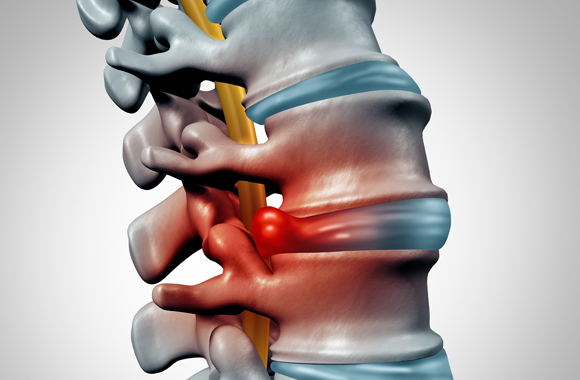Symptoms of a Herniated Disc
The symptoms of a herniated disc may vary greatly depending on its severity and location in the spine. Some of the most common symptoms include:
- Back pain
- Pain that radiates to the arms or legs
- Muscle weakness
- Tingling, aching or burning sensations in the affected area
Severe cases of a disc herniation may lead to immobility, incontinence and loss of bowel control. If you experience any of these symptoms, seek medical attention right away.

Types of Herniated Discs
The three most common types of herniated discs are:
Protrusion
A protruding disc is a contained herniation, also called a bulging disc. This is when pressure between the vertebrae causes the disc to protrude outward toward the back, placing slight pressure on the nearby nerves. While most people may feel mild pain with a protruding disc, some people do not experience any symptoms at all.
Extrusion
A disc extrusion is a non-contained herniation that often causes severe back pain. Because the disc places extensive pressure on the nearby nerves, this type of herniation may also lead to numbness or tingling in the extremities.
Sequestration
A sequestered herniation is what happens when non-contained herniations are left untreated for a prolonged period. As a result, the disc has entirely extruded its sponge-like contents, which can migrate to other locations, further compressing nerves and leading to severe back pain.
Diagnosing a Herniated Disc
Herniated discs are often diagnosed through tests, including an X-ray, MRI, and CT scan. In addition, there are certain symptoms that may make the presence of a herniated disc more likely. For example, severe pain in the legs or feet is often suggestive of sciatica, which is caused by compression on the nerve roots.
People with diabetes and osteoporosis are also more prone to herniated discs because their bones are weaker and more susceptible to fracture.
Treatment of a Herniated Disc
The severity of the condition will always determine the treatment for a herniated disc. Most cases of disc herniation are acute, lasting for less than six weeks. However, if back pain persists, then your provider may recommend:
Conservative Care
Non-surgical, conservative care is always the first step in treating a herniated disc. Your provider may recommend a variety of modalities, such as sports medicine, chiropractic, stretching, medication, massage therapy, physical therapy, and rest.
Surgical Interventions
Typically only recommended for patients who do not respond to non-surgical measures, surgery may alleviate the pressure on the surrounding nerves to reduce pain and improve function. Motion Orthopaedics utilizes the most innovative and state-of-the-art technologies to help improve the outcomes of our patients who undergo surgery for their herniated disc.

